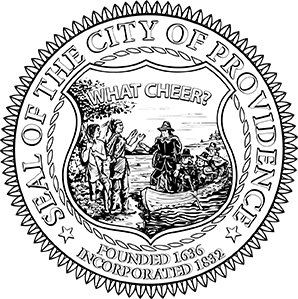Monday, September 30
City Receives USDA Grants Totaling $255,850 to Support Food Waste Diversion Programs and Composting Initiatives
Mayor Brett P. Smiley, Councilwoman Jo-Ann Ryan, Director of Sustainability Priscilla De La Cruz and Deputy Director of Sustainability Kevin Proft today unveiled the City of Providence’s comprehensive plan to implement innovative waste diversion, composting and food waste reduction programs across the city. These initiatives, supported by a $255,850 USDA grant and in conjunction with the recent recommendations from the Special Commission on Waste Management Services, are part of Providence’s ongoing commitment to reducing waste throughout the city and promoting a culture of environmental responsibility.
“Providence is committed to taking meaningful steps to reduce our environmental impact and foster a healthier, more resilient community,” said Mayor Brett Smiley. “These grant-funded programs help us reduce food waste, expand access to composting in every neighborhood and ensure that our neighbors, local businesses and schools are engaged in the fight against climate change. Together, through these initiatives and the thoughtful recommendations that came out of the Special Commission on Waste Management Services, we are laying the groundwork to improve recycling rates and build a more sustainable Providence for generations to come.”
Through the USDA grant, the City of Providence is investing in innovative initiatives to promote food waste diversion and composting. In schools, the City is expanding programs that transform cafeterias into interactive spaces where students actively participate in waste sorting and redistribution of surplus food. Providence is also supporting efforts to encourage neighbors to start backyard composting by offering site-specific setup and training. Currently, Providence has 11 composting sites that are managed through the Harvest Cycle program. With the USDA grant, 5 new sites will be added, bringing the total to 16 composting sites to help increase composting capacity and access. The City will also fund public education campaigns around composting and waste reduction. These comprehensive strategies aim to reduce food waste and foster a more sustainable, environmentally conscious community.
The City has awarded:
- Rhode Island School Recycling Project $73,550 to expand food waste diversion efforts at Providence Public Schools. The program aims to set up waste sorting stations monitored to save and redistribute surplus food. The program has now been introduced to Mary Fogarty Elementary School, D’Abate Elementary School, George J. West Elementary School and Spaziano Elementary School. At Mary Fogarty Elementary School alone, 75 student rangers diverted more than 9.7 tons of food waste and shared 2,946 pounds of food with hungry students during the 2023-2024 school year.
- Providence Gardenworks $54,200 to provide compost bins, supplies and mentorship to the community. They have also installed 30 compost systems and will expand to 40 in the coming months and offer compost training and multilingual support to ensure accessibility for all residents.
- Center for EcoTechnology $24,760 to help large food waste producers develop waste diversion strategies.
- Groundworks RI $27,715 to expand Providence’s food waste drop-off network by adding five new drop-off sites, repairing existing ones, improving bilingual signage and increasing composting capacity.
- Zero Waste Providence $84,540 to educate and engage the community on the benefits of composting and waste reduction. They will be conducting outreach at community events, farmers markets, local libraries and recreation centers, as well as going door-to-door in the neighborhoods around drop-off sites, while training residents to assist and providing stipends for participation.
“The City’s ability to carry out this exciting work is made possible by our incredible community partners who have been deeply engaged for years to make Providence a healthier and more environmentally sustainable place,” said Deputy Director of Sustainability Kevin Proft. “Their expertise, commitment and on-the-ground presence have driven meaningful change. These organizations share our vision and have been essential in implementing the practical solutions and innovative strategies that make environmental progress a reality.”
“I am very excited that the city is prioritizing community-scale composting through this grant and investing in the diverse composting ecosystem in Providence rather than focusing on a single approach,” said Harvest Cycle Manger Ella Kilpatrick Kotner. “The multi-pronged approach — grassroots community outreach, school programming, business technical assistance, and building community-based collection and processing infrastructure — is not only essential to achieving our food waste diversion goals, but also facilitates the countless other community benefits that come from people connecting with their food, their soil, and their neighbors.”
As part of Providence’s broader sustainability strategy, the City has developed a plan to enforce the State of Rhode Island’s plastic bag ban. This multi-pronged approach will include more stringent oversight of businesses, targeted outreach to inform the public about the ban and ongoing efforts to reduce single-use plastic waste across the city.
Additionally, earlier this year, the City’s Special Commission on Waste Management Services was established to evaluate the City’s waste management practices and identify opportunities for improving efficiency, sustainability and cost-effectiveness. The Commission’s primary goals include:
- reducing city costs related to waste management,
- improving customer service for residential waste and recycling,
- reducing the tonnage of waste sent to the Central Landfill,
- decreasing residential recycling contamination rates, and
- mitigating the impacts of climate change through waste reduction efforts.
“As the chair of the Special Commission on Waste Management Services, I couldn’t be prouder of the progress we’ve made,” said Councilwoman Jo-Ann Ryan (Ward 5). “After thorough evaluation, we’ve produced a comprehensive set of recommendations that reduce waste, cut costs, and boost efficiency, laying the groundwork for a more sustainable Providence. This grant will help to make the Commission’s vision a reality. Expanding city-wide food waste diversion is central to Commission’s proposed actions, and I am thrilled to see these new initiatives come to life with the support of our community partners.”
For more information on Providence’s sustainability initiatives, visit https://climatereadypvd.providenceri.gov/.

